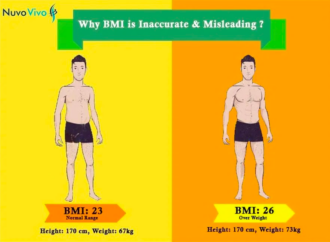
The BMI, or Body Mass Index is the most used method for establishing if a patient is obese and thus at risk of developing heart disease, diabetes, and related illnesses. To calculate the BMI, our weight is measured in kilograms and divided by our height in metres squared. But is it accurate?
In an earlier blog I discussed the origin of the BMI which was developed by a Belgian mathematician, statistician, sociologist, and astronomer in the 1830s. He was not a medical doctor or a scientist.
An article in The Journal of Internal Medicine states: “It is well established that BMI has numerous limitations; it cannot distinguish between fat and lean mass and is not indicative of body fatness. This may explain why approximately 50% of overweight and approximately 30% of obese individuals, based on BMI, are free from any obvious sign of metabolic and cardiovascular complications”.
Rephrased, the BMI does not distinguish between fat and muscle. Muscle weights around 18% more than fat so that when we exercise and develop muscle, we will weigh heavier than if we were to store the same amount of fat. An elite athlete with a high muscle mass can have a less healthy BMI than someone who does not exercise and has higher fat stores.
The BMI does not take into consideration where the fat is stored. Fat deposited on our hips has a lesser impact on our health than fat deposited on our abdomen.
Unfortunately, waist circumference or waist-to-hip ratio are not accurate indicators of health either as they do not distinguish which type of fat is contained in the abdomen. Visceral fat stored in our abdomen is associated with an increased risk of heart disease and other metabolic issues.
Unfortunately, there is no infallible measure of health. We are all different in height, stature, weight, muscle mass and ethnicity.
My advice, at the risk of being repetitive, is to live a healthy life. Choose healthier lifestyle options; eat a low glycaemic index diet, choose whole foods, and avoid processed foods, enjoy gentle exercise, reduce stress, and take time for yourself.
Lastly, learn what it means to love yourself as this is at the heart of a good life.
If you want to chat about this, please message me,
In love, Jenny
Ethnic differences in adiposity and diabetes risk–insights from genetic studies, The Journal of Internal Medicine Volume 288 Issue 2, H. Yaghootkar, B. Whitche2, J. D. Bell & E. L. Thomas